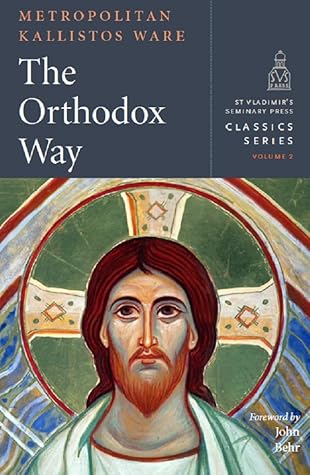More on this book
Community
Kindle Notes & Highlights
God cannot be grasped by the mind. If he could be grasped, he would not be God.1 Evagrius of Pontus
God cannot be grasped by the mind. If he could be grasped, he would not be God.1 Evagrius of Pontus
Yet, in the second place, this God of mystery is at the same time uniquely close to us, filling all things, present everywhere around us and within us. And he is present, not merely as an atmosphere or nameless force, but in a personal way. The God who is infinitely beyond our understanding reveals himself to us as person: he calls us
St Nicolas Cabasilas, God our King is more affectionate than any friend, more just than any ruler, more loving than any father, more a part of us than our own limbs, more necessary to us than our own heart.4
St Nicolas Cabasilas puts it, “He is both the inn at which we rest for a night and the final end of our journey.”
The Greek Fathers liken man’s encounter with God to the experience of someone walking over the mountains in the mist: he takes a step forward and suddenly finds that he is on the edge of a precipice, with no solid ground beneath his foot but only a bottomless abyss. Or else they use the example of a man standing at night in a darkened room: he opens the shutter over a window, and as he looks out there is a sudden flash of lightning, causing him to stagger backwards, momentarily blinded. Such is the effect of coming face to face with the living mystery of God: we are assailed by dizziness; all
...more
We see that it is not the task of Christianity to provide easy answers to every question, but to make us progressively aware of a mystery. God is not so much the object of our knowledge as the cause of our wonder. Quoting Ps 8.1, “O Lord, our Lord, how wonderful is thy name in all the earth,” St Gregory of Nyssa states: “God’s name is not known; it is wondered at.”
We see that it is not the task of Christianity to provide easy answers to every question, but to make us progressively aware of a mystery. God is not so much the object of our knowledge as the cause of our wonder. Quoting Ps 8.1, “O Lord, our Lord, how wonderful is thy name in all the earth,” St Gregory of Nyssa states: “God’s name is not known; it is wondered at.”
So, in the Christian context, we do not mean by a “mystery” merely that which is baffling and mysterious, an enigma or insoluble problem. A mystery is, on the contrary, something that is revealed for our understanding, but which we never understand exhaustively because it leads into the depth or the darkness of God. The eyes are closed—but they are also opened. Thus, in speaking about God as mystery, we are brought to our second “pole.” God is hidden from us, but he is also revealed to us: revealed as person and as love.
Faith, then, signifies a personal relationship with God; a relationship as yet incomplete and faltering, yet none the less real. It is to know God not as a theory or an abstract principle, but as a person. To know a person is far more than to know facts about that person. To know a person is essentially to love him or her; there can be no true awareness of other persons without mutual love. We do not have any genuine knowledge of those whom we hate. Here, then, are the two least misleading ways of speaking about the God who surpasses our understanding: he is personal, and he is love. And these
...more
Third, here is a prayer by a seventeenth-century Russian bishop, St Dimitrii of Rostov: Come, my Light, and illumine my darkness. Come, my Life, and revive me from death. Come, my Physician, and heal my wounds. Come, Flame of divine love, and burn up the thorns of my sins, kindling my heart with the flame of thy love. Come, my King, sit upon the throne of my heart and reign there. For thou alone art my King and my Lord.9
“Using riddles . . .”: St Gregory is at pains to emphasize that the doctrine of the Trinity is “paradoxical” and lies “beyond words and understanding.” It is something revealed to us by God, not demonstrated to us by our own reason. We can hint at it in human language, but we cannot fully explain it. Our reasoning powers are a gift from God, and we must use them to the full; but we should recognize their limitations. The Trinity is not a philosophical theory but the living God whom we worship; and so there comes a point in our approach to the Trinity when argumentation and analysis must give
...more


